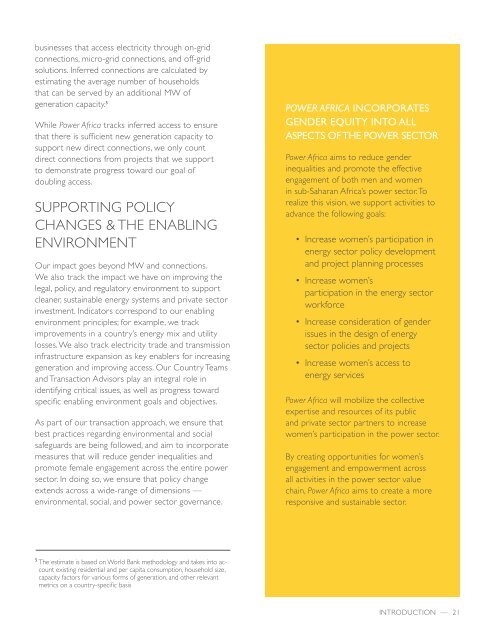THE ROADMAP
1Qw0wPK
1Qw0wPK
Create successful ePaper yourself
Turn your PDF publications into a flip-book with our unique Google optimized e-Paper software.
usinesses that access electricity through on-grid<br />
connections, micro-grid connections, and off-grid<br />
solutions. Inferred connections are calculated by<br />
estimating the average number of households<br />
that can be served by an additional MW of<br />
generation capacity. 5<br />
While Power Africa tracks inferred access to ensure<br />
that there is sufficient new generation capacity to<br />
support new direct connections, we only count<br />
direct connections from projects that we support<br />
to demonstrate progress toward our goal of<br />
doubling access.<br />
SUPPORTING POLICY<br />
CHANGES & <strong>THE</strong> ENABLING<br />
ENVIRONMENT<br />
Our impact goes beyond MW and connections.<br />
We also track the impact we have on improving the<br />
legal, policy, and regulatory environment to support<br />
cleaner, sustainable energy systems and private sector<br />
investment. Indicators correspond to our enabling<br />
environment principles; for example, we track<br />
improvements in a country’s energy mix and utility<br />
losses. We also track electricity trade and transmission<br />
infrastructure expansion as key enablers for increasing<br />
generation and improving access. Our Country Teams<br />
and Transaction Advisors play an integral role in<br />
identifying critical issues, as well as progress toward<br />
specific enabling environment goals and objectives.<br />
As part of our transaction approach, we ensure that<br />
best practices regarding environmental and social<br />
safeguards are being followed, and aim to incorporate<br />
measures that will reduce gender inequalities and<br />
promote female engagement across the entire power<br />
sector. In doing so, we ensure that policy change<br />
extends across a wide-range of dimensions —<br />
environmental, social, and power sector governance.<br />
POWER AFRICA INCORPORATES<br />
GENDER EQUITY INTO ALL<br />
ASPECTS OF <strong>THE</strong> POWER SECTOR<br />
Power Africa aims to reduce gender<br />
inequalities and promote the effective<br />
engagement of both men and women<br />
in sub-Saharan Africa’s power sector. To<br />
realize this vision, we support activities to<br />
advance the following goals:<br />
• Increase women’s participation in<br />
energy sector policy development<br />
and project planning processes<br />
• Increase women’s<br />
participation in the energy sector<br />
workforce<br />
• Increase consideration of gender<br />
issues in the design of energy<br />
sector policies and projects<br />
• Increase women’s access to<br />
energy services<br />
Power Africa will mobilize the collective<br />
expertise and resources of its public<br />
and private sector partners to increase<br />
women’s participation in the power sector.<br />
By creating opportunities for women’s<br />
engagement and empowerment across<br />
all activities in the power sector value<br />
chain, Power Africa aims to create a more<br />
responsive and sustainable sector.<br />
5 The estimate is based on World Bank methodology and takes into account<br />
existing residential and per capita consumption, household size,<br />
capacity factors for various forms of generation, and other relevant<br />
metrics on a country-specific basis<br />
INTRODUCTION — 21


